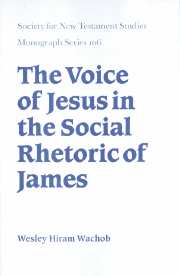Book contents
- Frontmatter
- Contents
- Acknowledgments
- Sources and abbreviations
- 1 Introduction
- 2 The history of research and the present investigation
- 3 The inner texture of James 2.1–13
- 4 The intertexture of James 2.1–13
- 5 The social and cultural texture of James 2.1–13
- 6 Conclusion
- Bibliography
- Index of sources and authors
- Index of biblical references
- Index of subjects
2 - The history of research and the present investigation
Published online by Cambridge University Press: 22 September 2009
- Frontmatter
- Contents
- Acknowledgments
- Sources and abbreviations
- 1 Introduction
- 2 The history of research and the present investigation
- 3 The inner texture of James 2.1–13
- 4 The intertexture of James 2.1–13
- 5 The social and cultural texture of James 2.1–13
- 6 Conclusion
- Bibliography
- Index of sources and authors
- Index of biblical references
- Index of subjects
Summary
Introduction
The purpose of this chapter is to review the history of research on the Epistle of James and to locate the present study with respect to both past and current scholarly investigations. First, we shall discuss some of the historical, theological, and literary problems surrounding James, and the ways in which scholarship dealt with these issues up to the publication of Martin Dibelius' commentary. Second, because Dibelius' conclusions have dominated Jamesian scholarship for more than seventy years and remain today the most influential assessment of James, we shall focus on his research. We shall concentrate on his use of the so-called “genre,” paraenesis. Finally, we shall build on this previous scholarship as we look at more recent research which suggests rhetorical criticism as a promising method for the investigation and interpretation of James.
The Epistle of James as a problem
The history of research on the Epistle of James reveals that it is not a popular document; it is in fact maligned and neglected (Adamson, 1989, p. x; Davids, 1982, p. 1; L. T. Johnson, 1986, p. 453; Laws, 1980, pp. 1–2; and Popkes, 1986, p. 9). When James is studied, it is seldom read on its own terms (L. T. Johnson, 1985, pp. 166–69, 178–79).
- Type
- Chapter
- Information
- The Voice of Jesus in the Social Rhetoric of James , pp. 25 - 58Publisher: Cambridge University PressPrint publication year: 2000



